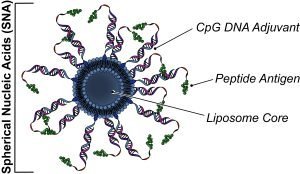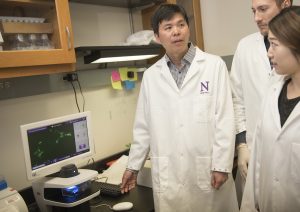Research
Vaccine design can dramatically improve cancer immunotherapies
May 06, 2019
Effectiveness depends on molecular architecture and 3D presentation of components
EVANSTON, Ill. — When it comes to the effectiveness of nanotherapeutic vaccines, shape matters.
 A Northwestern University team investigated a set of spherical nucleic acids (SNAs) for their potential to stimulate cancer-quelling immune responses. After comparing a series of compositionally identical yet structurally different vaccines by testing them on multiple animal models, the researchers found the structure of SNAs in one vaccine dramatically outperformed the others, which ranged from ineffective to nearly curative.
A Northwestern University team investigated a set of spherical nucleic acids (SNAs) for their potential to stimulate cancer-quelling immune responses. After comparing a series of compositionally identical yet structurally different vaccines by testing them on multiple animal models, the researchers found the structure of SNAs in one vaccine dramatically outperformed the others, which ranged from ineffective to nearly curative.
Vaccines with the superior structure completely eliminated tumors in 30% of animals and improved their overall survival from cancer. The vaccine also protected the animals from reemerging tumors.
“This observation shows the importance of chemical structure and three-dimensional presentation of active components in the design of vaccines,” said Northwestern’s Chad A. Mirkin, who co-led the study. “This information will help us rationally design SNA vaccines that can raise the strongest possible anti-cancer immune responses. Having a clear design strategy also will accelerate the development of vaccines for many types of cancer and potentially other diseases.”
The study will be published online during the week of May 6 in the Proceedings of the National Academy of Sciences.
Mirkin is the George B. Rathmann Professor of Chemistry in Northwestern’s Weinberg College of Arts and Sciences and director of the International Institute for Nanotechnology. He co-led the study with Bin Zhang, professor of medicine and microbiology-immunology at the Northwestern University Feinberg School of Medicine, and Andrew Lee, research assistant professor of chemical and biological engineering in Northwestern’s McCormick School of Engineering.
Cancer immunotherapies artificially stimulate the patient’s immune system to find and attack the disease. So far, new immunotherapies, called checkpoint inhibitors, act by unlocking immune responses that are suppressed by tumors. But they are effective only in certain types of cancer and in a fraction of patients.

“Another potentially more powerful approach is to raise and boost immune responses with therapeutic vaccines,” Lee said. “This approach, however, has needed breakthroughs in vaccine design to unlock its potential in treating cancer in the clinic.”
The development of SNAs could be the breakthrough for which people have been waiting. Invented by Mirkin, SNAs are synthetic globular — rather than linear — forms of DNA and RNA that surround a nanoparticle core. Roughly 50 nanometers in diameter, the tiny structures possess the ability to enter cells, including immune cells, for targeted treatment delivery.
In the study, the Northwestern team compared SNAs that have different structures but the same peptides, DNA and other general components. All vaccines included an antigen (a substance that is recognized and targeted by an immune response) and an adjuvant (a substance that enhances the body’s immune response to the antigen). In this case, the DNA is the adjuvant, and the peptide is the antigen.
The only thing that changed in each vaccine was the position of the peptide antigen, which was either housed in the core of the SNA, interspersed with the DNA or attached to the DNA. These changes led to major differences in how the immune system recognized and processed molecular cues, ultimately affecting the quality of the immune response generated by the vaccine. In the study, the peptide antigen interspersed with the DNA performed best.
“The study shows that SNAs and our ability to refine SNA structures can dramatically improve the anti-tumor immune responses,” Zhang said. “This shows promise in our ability to improve the performance of vaccines and eventually use them in patient care.”

Mirkin is a member of the Robert H. Lurie Comprehensive Cancer Center of Northwestern University and has appointments in the Feinberg School of Medicine and McCormick School of Engineering.
The study, “Rational vaccinology with spherical nucleic acids,” was supported by the National Cancer Institute of the National Institutes of Health (award number U54CA199091), the Office of Naval Research (award number N00014-15-0043), the Prostate Cancer Foundation, the Movember Foundation (award number 17CHAL08), the Robert H. Lurie Comprehensive Cancer Center of Northwestern University and the Vannevar Bush Faculty Fellowship program.
The full article can be viewed at Northwestern Now.
The International Institute for Nanotechnology at Northwestern University is an umbrella organization that represents and unites more than $1 billion in nanotechnology research, education and supporting infrastructure.